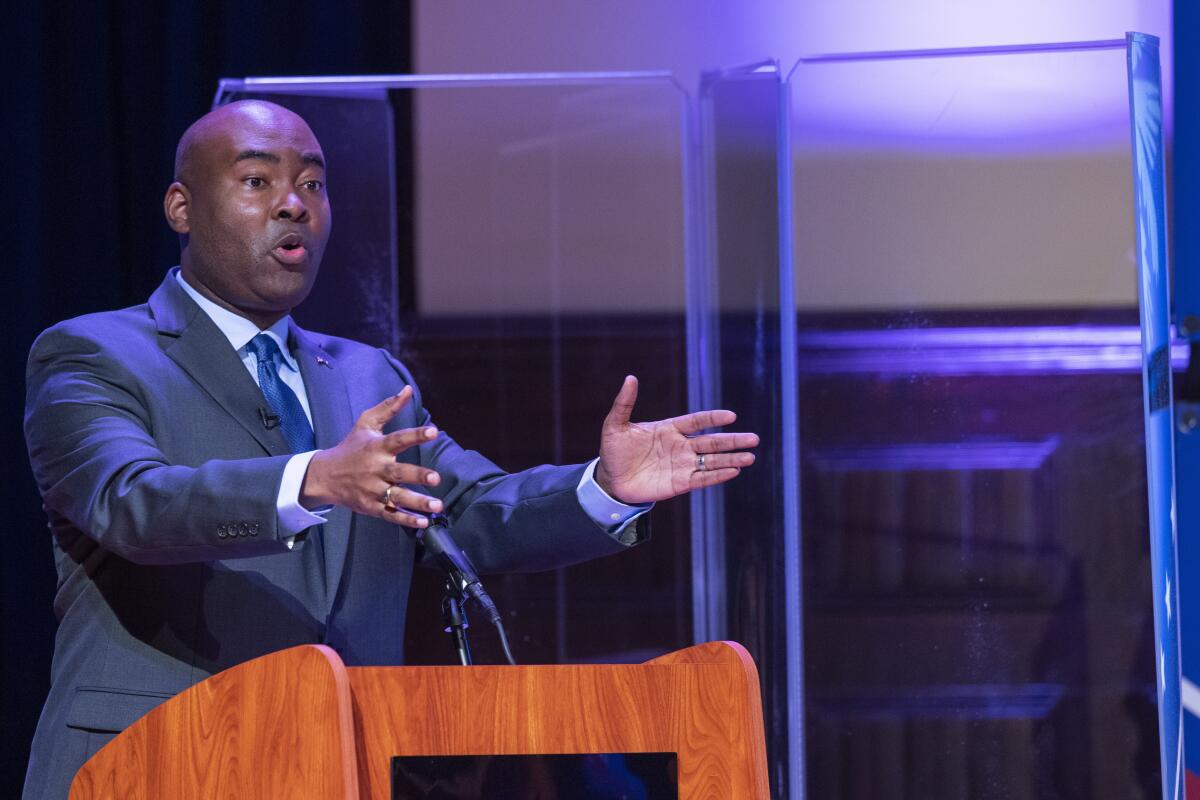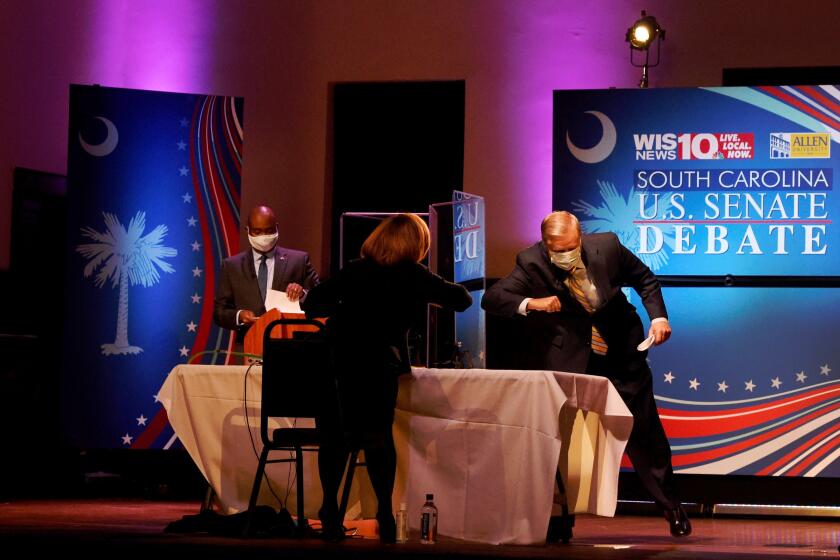Democratic challenger in South Carolina Senate race raises record $57 million

- Share via
COLUMBIA, S.C. — South Carolina Democrat Jaime Harrison has shattered congressional fundraising records, bringing in $57 million in the final quarter for his U.S. Senate campaign against Republican incumbent Lindsey Graham as the GOP tries to retain control of the chamber in the Nov. 3 election.
Harrison’s campaign said Sunday that the total was the largest ever during a single three-month period by any Senate candidate. That tops the $38 million raised by Democrat Beto O’Rourke in 2018 in the final fundraising period of his challenge to Sen. Ted Cruz (R-Texas), who won the race, and comes as other Democratic Senate challengers continue to rake in eye-popping cash against Republican incumbents.
The third-quarter amount brings Harrison’s overall fundraising for the campaign to $86 million. Attributing the success to grassroots support, Harrison’s campaign said the $57 million came in the form of 1.5 million donations from 994,000 donors. The average contribution was $37.
“This campaign is making history, because we’re focused on restoring hope back to South Carolina,” said Guy King, Harrison’s campaign spokesman. “While Lindsey Graham continues playing political games in Washington, Jaime Harrison is remaining laser-focused on the real issues impacting people here — like healthcare, broadband access, and COVID relief for businesses and families.”
Jaime Harrison, a Black Democrat in racially polarized South Carolina, is giving GOP Sen. Lindsey Graham the toughest fight of his political career.
Graham hasn’t released fundraising totals for the latest quarter, although it’s likely he’s been eclipsed by Harrison, an associate Democratic National Committee chairman and former lobbyist. Last month, Graham made a public fundraising plea to help him keep up with Harrison, saying on Fox News that he was “getting killed financially” by Harrison, who he predicted would “raise $100 million in the state of South Carolina.”
“The money is because they hate my guts,” Graham added.
In a statement Sunday, Graham questioned whether the money would have any real effect on South Carolina’s electorate, which has not voted in a Democratic candidate for Senate since the 1998 reelection of Sen. Fritz Hollings.
“The problem is there’s not enough money in the world to convince South Carolinians to vote for the radical liberal agenda,” Graham said, citing top Democrats such as House Speaker Nancy Pelosi of San Francisco and Sen. Charles E. Schumer of New York as leaders he says support that agenda.
Other Senate challengers are making financial strides. Kentucky’s Amy McGrath hasn’t released third-quarter figures in her race against Senate Majority Leader Mitch McConnell but had raised $47 million as of the end of June, compared with McConnell’s $37 million, which was through September. In her challenge to Maine Sen. Susan Collins, Democrat Sara Gideon had taken in $24 million as of the end of June, compared with the incumbent’s $17 million through last month.
With advertising for Harrison and Graham already wall-to-wall online and on air in South Carolina’s relatively inexpensive media markets, it’s hard to see where Harrison’s cash could help him eke out more visibility.
Harrison has been far outspending Graham on television time in South Carolina, a trend the Democrat aims to continue through Nov. 3. According to Advertising Analytics, a media monitoring and analytics agency, Harrison has spent or reserved more than $61 million in TV ad spots, with more than $14 million of that coming in the next three weeks.
Over the same span, Graham has spent or reserved $22 million worth of television advertising, with $4 million in the campaign’s closing weeks.
Television stations are upping their rates, one consultant said, charging campaigns several times their typical amounts as a way to capitalize on the limited ad space they’re able to offer.
“There’s no question that the mountain of cash in this race, specifically from the Harrison campaign, has led to political organizations paying at least twice or three times as much as they would normally pay for airtime in a South Carolina election,” said Kurt Pickhardt, a Republican media consultant and vice president of Smart Media Group, a Washington-based media buying firm. “There’s also a legitimate question to be asked as to whether or not the Harrison campaign can even spend all of the money they’ve raised.”
Asked how the additional money could possibly be spent, Harrison campaign manager Zack Carroll told the Associated Press that they planned to hold nothing back, using “every dollar donated” in digital organizing, communication with Black voters and ads in seven media markets that cover the state.
Third-party organizations supporting both candidates are also occupying much of the available ad space.
The Senate Leadership Fund is dumping $10 million into an ad blitz in the campaign’s closing weeks, and another pro-Graham political action committee has reserved more than $2 million in October and November. Groups backing Harrison including the Lincoln Project, a group of current and former Republican officials who want to defeat President Trump, and the Lindsey Must Go PAC have spent millions more in television and digital ad buys.
At the end of June, both candidates were roughly matched at about $30 million apiece, money that has come largely from out of-state donors. For the race overall, not including the most recent quarter, which isn’t yet available, Harrison’s in-state contribution amount is 10%. Graham’s is 14%.
The latest fundraising report comes one day before the start of what is predicted to be a contentious hearing in the Senate Judiciary Committee on Trump’s nomination of Judge Amy Coney Barrett to the Supreme Court. Graham is the committee chairman.
His commitment to confirming Trump’s third nominee to the court has become a focal point in the Senate campaign, with Harrison frequently chiding Graham for reversing on previous promises not to consider election-year nominations. Graham has responded by saying he feels Democrats would do the same if given the choice.
During Harrison’s Oct. 3 debate with Graham, social media users across the country chimed into tweet threads with pledges to donate as often as they could. In the two days following that matchup, Harrison’s campaign said it brought in $1.5 million — as much as the effort had raised in some previous entire fundraising quarters.
More to Read
Sign up for Essential California
The most important California stories and recommendations in your inbox every morning.
You may occasionally receive promotional content from the Los Angeles Times.











